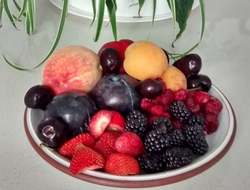Phytochemicals
Published: July 31, 2020
The term phytochemicals refers to a large group of compounds found in plants.
There are tens of thousands of phytochemicals which are divided into groups: the largest being polyphenolic phytochemicals.
There are more than 8000 polyphenol compounds and these are divided into classes.
Flavonoids are the largest class and include flavonols, flavanones, flavanols, isoflavones, and flavones.
Other phytochemicals include carotenoids, terpenes, organosulphides, phenolic acids, lignans, saponins, phytosterols, glucosinolates, and isothiocyanates.
Of particular interest, from a nutritional health perspective, are those found in fruits, vegetables, legumes, grains, herbs, tea, and spices, and the potential positive effects they may have on health status.
While some plant foods have been identified as containing a particular phytochemical, most plant foods contain many different phytochemicals found as various forms of glucosides.
Metabolism of phytochemicals is affected by the composition of the phytochemical which is influenced by plant genetics, environmental conditions, the ripeness of the food, and how the food is processed and stored.
The prospect of maintaining good health and preventing diseases associated with the aging process has prompted the promotion of particular foods such as:
- blueberries
- acai berry
- chocolate
- teas (green and black)
- Ginkgo Biloba
- Ginseng
- garlic
- Ginger
In addition, the nutritional supplement market has seen an influx of nutrition related products which not only claim to provide anti-oxidant benefits, but also make unsupported claims about specific health benefits such as:
- improved memory
- heart health promotion
- cancer prevention
While phytochemicals are thought to have health promoting properties, there is insufficient scientific evidence to support many health benefit claims.
Observational studies indicate that people who consume higher quantities of fruits, vegetables, and other plant foods show a decreased risk of many negative health risks.
Studdies to support the use of supplemental phytochemicals, particularly anti-oxidants, are limited and whether anti-oxidant supplements support good health remains unclear.
Continuing research indicates that phytochemicals have various important roles in the body such as:
- Anti-oxidant behaviour (scavenging free radicals)
- Anti-estrogenic effects (structurally similar to estrogen)
- Inhibition of tumour growth
- Cholesterol lowering effects.
Anti-oxidant properties
An anti-oxidant is a compound that protects other compounds from oxidation processes that naturally occur in your body. In your body, oxidation processes...link to the full article to learn more.
References
1.
Whitney, E. & Rady Rolfes, S. (2005). Understanding Nutrition. Belmont, CA: Thomson Wadsworth
2.
Gropper, S.S., Smith, J.L. & Groff, J.L. (2005). Advanced Nutrition and Human Metabolism (4thEd.). Belmont, CA: Thomson Wadsworth.

